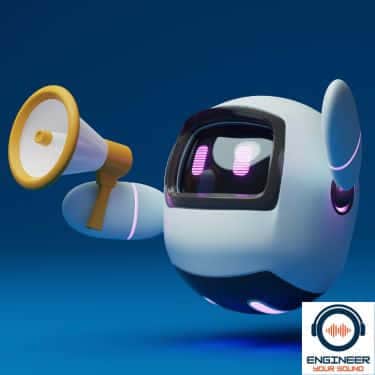In the rapidly evolving world of technology, artificial intelligence (AI) continues to break barriers and redefine possibilities. One fascinating area where AI has made significant strides is in the sphere of voice generation. Can AI really generate voices? If so, how does this process work, and is it even legal?
AI can generate voices. With the advancements in natural language processing and machine learning techniques, AI models can now generate human-like voices that are indistinguishable from real voices.
These models use large amounts of data to learn human speech patterns, intonations, and nuances, allowing them to generate high-quality voices for various applications such as virtual assistants, audiobooks, and voiceovers.
In this article, I will delve into the intricacies of AI-generated voices, shedding light on how they are produced and whether the human ear can discern them from natural human voices.
Furthermore, I’ll share personal experiences with free AI voice generators, providing a firsthand account of this remarkable technology.

Can AI Generate Voices?
AI can indeed generate voices. With advancements in fields like deep learning and natural language processing, AI can create synthetic voices that mimic human speech with remarkable accuracy.
The technology works by feeding vast amounts of data into sophisticated AI models, which learn the nuances of human speech, including intonations, accents, and speech patterns.
Over time, these AI models refine their output, creating synthetic voices that are incredibly realistic. This technology is now widely used in various sectors, from customer service bots to virtual personal assistants and broadcasting.
How Does AI Generate Voices?
AI generates voices using a process called text-to-speech (TTS). This process converts written text into spoken words using deep learning techniques.
The AI models are trained on vast datasets consisting of hours of human speech. The models learn and understand the nuances, patterns, and tonality present in human speech from these datasets.
Once trained, they can generate synthetic speech that is hard to distinguish from a human voice.
The process involves multiple stages, including text analysis, acoustic modelling, and finally, voice synthesis.
Advancements in TTS technology have led to the rise of AI voices that can mimic emotions, stress patterns, and intonations, making them increasingly human-like.
Can You Tell The Difference Between AI-Generated And Real Voices?
Determining the difference between AI-generated and real voices can be surprisingly challenging. The sophistication and advancements in modern AI voice synthesis have led to the production of highly realistic, human-like voices.
However, subtle nuances in speech, such as emotional inflexion, unique personal accents, or the spontaneity of natural conversation, may still elude AI voices. These are areas where trained human ears might be able to discern the difference.
Despite this, the line between AI-generated and human speech continues to blur, and for the untrained listener, the difference might be nearly indistinguishable.
Can AI Do Voice Acting?
While AI has made significant strides in voice generation, it’s worth noting voice acting involves more than just producing sounds. Voice acting is an art form that requires expressing emotions, creativity, and distinct character traits, which, at present, AI cannot replicate fully.
While AI-generated voices can read scripts and mimic human intonation, they lack the emotional depth and nuanced performances that human voice actors provide. However, the technology is rapidly evolving, and future advancements may enhance the capability of AI in the realm of voice acting.
Currently, AI voice acting finds its place in areas where the demand for emotional depth and creative expression is minimal, like informational content, customer service interactions, or simple narration.
Is There Any Free AI Voice Generator?
There are numerous free AI voice generators available online, catering to various needs. Some of the popular ones include Google’s Text-to-Speech, IBM Watson Text-to-Speech, and Amazon Polly. These platforms offer a range of synthetic voices in multiple languages and accents.
However, it’s worth noting that while these services are free, they may have usage limits for non-paying users. For unlimited access or commercial usage, you may need to opt for their premium services.
In my personal experience, these tools have proven to be quite effective, although they may not always perfectly replicate the richness and emotional depth of human speech.
Can I Create An AI Of My Own Voice?
Creating an AI of your own voice is indeed possible with the advancements in AI technology. Various services like Lyrebird and Resemble.AI allow you to clone your voice using AI.
You need to provide these platforms with recordings of your speech, after which their algorithms analyze the characteristics of your voice and create a unique voice model. This voice model can then generate speech that sounds remarkably similar to your own voice.
However, it’s important to note that the quality of the AI-generated voice largely depends on the quality and quantity of the sample recordings you provide. As with other AI technologies, the more data it has to learn from, the better the results.
Also, it’s crucial to be aware of the ethical and legal implications of voice cloning before proceeding with creating an AI of your own voice.
With so many new advancements in this technology, there are always new platforms coming online that will allow you to record your own voice and then generate an AI clone of it. At present, Speechify is the platform that seems to be most dominant in this market.
Final Thoughts
Artificial Intelligence has undeniably revolutionized the realm of voice technology, creating synthetic voices so realistic they’re nearly indistinguishable from human speech.
The advancements in text-to-speech models have led to the emergence of AI voices that mimic human emotion, stress patterns, and intonations.
While voice acting remains a territory where human creativity and emotional depth continue to outshine AI, the rapid evolution of technology paints a promising future.
Free AI voice generators offer a glimpse into this advancement, making text-to-speech services accessible to all.
The ability to create an AI model of your own voice further testifies to the leaps in this technology, although it comes with its own ethical and legal considerations.
As we navigate this exciting landscape, we must remain cognizant of the fine balance between technological advancement and ethical responsibility.
